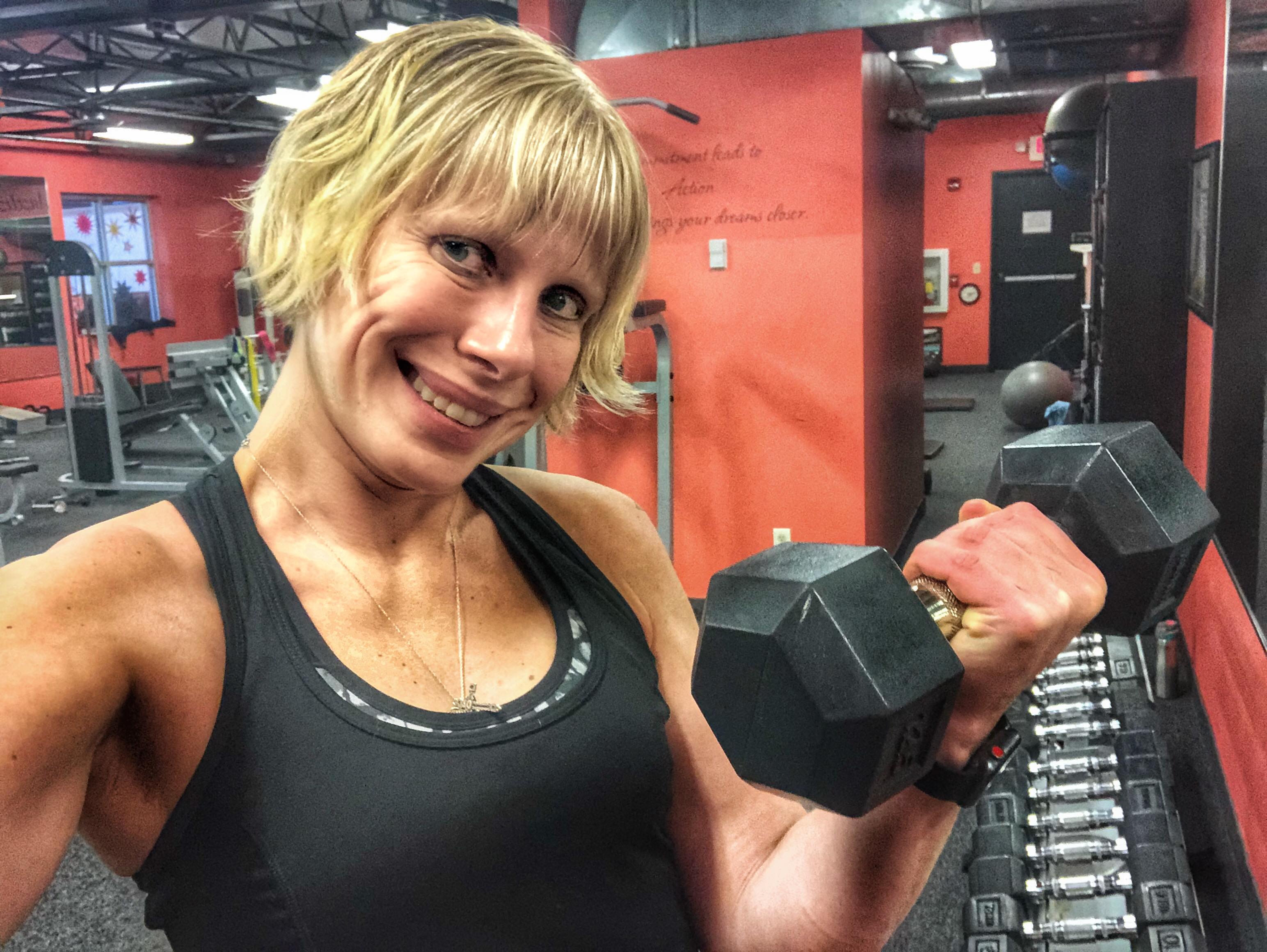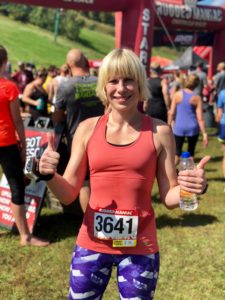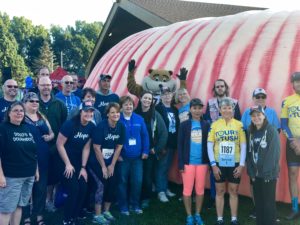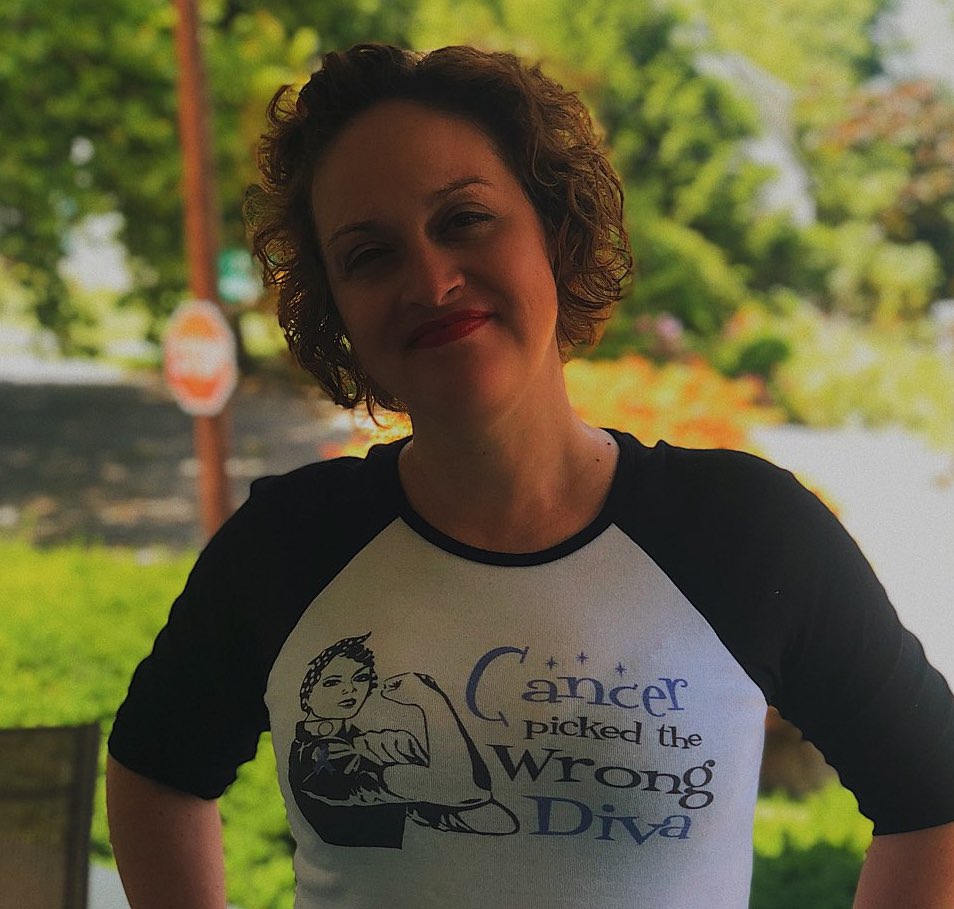
Today is my expiration day. I smiled as I jumped out of bed and made myself a cup of coffee. I’m starting the day with my usual run with my two dogs. The world around us is still asleep. As we run down the dark wooded path, I am reflecting on the last 18 months. The 18 months that the doctors gave me to live, as “Ain’t no Grave” covered by Robert Robinson, a fellow cancer survivor, comes blaring through my headphones. Somehow, today of all days, the song is the most fitting.
Eighteen months, 78 weeks, 546 days, 13,104 hours, 786,240 minutes. I heard him, but I didn’t really hear him. I stared into his face trying to keep composure. Eighteen months with a good quality of life was all the doctor was offering me. I went to speak, and
my voice cracked. Tears poured down my cheeks. Eighteen months was better than the status quo, but was it really enough time? His look was that of understanding, “A good quality of life for someone so young is very important,” he proceeded. What was quality of life? The life I had before I was sick? The one with no physical limitations?
“Young people have a really hard time coping with colostomy. Acceptance typically comes with age,” the doctor stared me down as tears rolled down my cheeks. Hard time doesn’t even describe it. The first couple weeks I didn’t know how I was going to make it to the next day, let alone a week, a month, a year. Was it really better now? I was coping better, that’s for sure. “Given your diagnosis, the immediate goal is to give you quality of life with what little time you do have.” The lump in my throat was refusing to go away. I had so much to say, yet nothing came out. Time suddenly became the most important thing in the world. Time wasn’t something I had.
As if the news of my short life wasn’t devastating enough, the doctor proceeded to ramble on monotonously, “The surgeon found cancer cells on your uterine wall. I want you to prepare yourself that a full hysterectomy is a real possibility.” Here I was, worried about trying to preserve my eggs during chemotherapy, while the doctor talked about taking away the possibility of having children forever as if we were reviewing menu options for Sunday brunch. Until the cancer diagnosis, I didn’t really think that I even wanted children. Focused on my career, I’ve always thought I’d have more time to make the decision that was right for me. The loss was so real and profound. I felt as though I was being robbed of something from the inside out. My aunt looked over encouragingly, “It’s not like you need those parts anyway.” Excuse me? I don’t need those parts? I was screaming inside my head. What about a possibility of having my own family? One day reading a bedtime story to my son or daughter? I was getting ahead of myself. Who was I kidding? Eighteen months. That was all that was on the table.
“I want you to understand that surgery might not be successful,” the doctor continued. This wasn’t a shock. The latest study on hyperthermic intraperitoneal chemotherapy (HIPEC) conducted in conjunction with researchers at the University at Buffalo, University of Michigan, Mount Sinai Hospital, and the University of Toronto showed the mortality rate between 8-11 percent with perioperative complication rate of 27–56 percent. Furthermore, the five year overall survival rate for colorectal adenocarcinoma was just 38.2 percent. One of three makes it, plain and simple. I realized in that moment how much I wanted to live. The surgery was a chance; a chance to have a normal life. Reconnection at the time of HIPEC meant getting rid of the dreadful bag forever. A glimmer of a normal life was worth the risk any day of the week. I so desperately wanted some semblance of my old life back, the one without pain, constant worry, nausea, and the bag. I wanted my old wardrobe back. I wanted to go swimming. I wanted to run the Tough Mudder, the Spartan, or even the Warrior Dash. I wanted the old me back, the one who wasn’t dying.
I couldn’t help but wonder what my life would have been like if the doctors would have caught this disease on time? With no family history of cancer, I was not a candidate for a colonoscopy until the age of 50. My last physical, I passed with flying colors. My family physician went as far as to deem me the healthiest one of his patients. Little did he know of a tumor that had set up shop in my colon and was growing every day. The “what ifs” and the “could have beens” plague my mind every day.
I took a deep breath and tried to think back on my life. It has been a good one! Surrounded by friends and family, armed with a great career, I was on top of the world up until that fateful day of April 11, 2017. It was a day like any other. Having caught a bad case of E.coli in France two weeks prior I was still recovering. I was not 100 percent and have not felt like myself since returning stateside. That morning, I woke up to find a lot of blood in my stool and immediately called my family doctor. His nurse advised to go to urgent care. I knew blood could mean cancer, IBD, Crohn’s or any number of other maladies; none of them good. Numerous blood tests to check for infection and parasites came back with nothing. The urgent care doctor collected a stool sample and promptly referred me to a gastroenterologist the following morning.
The gastroenterologist was the crude sort who looked me up and down, saw a pale girl with tattoos and losing weight, and assumed that it had to be drugs. It never occurred to him that I, a successful professional, was truly sick. My tests were squeaky clean: no parasites, no Campylobacter, no Salmonella, no Shigella, no Vibrio, no Yersinia, no Shiga Toxin, no Norovirus, or Rotavirus. He scratched his head, gave me a quizzical look, gazed deeply into my eyes and told me: “You have all the symptoms of a chronic pot smoker, just admit that you are on drugs.” I haven’t smoked pot a day in my life and did not condone drug use on any level. His statement was offensive. Furthermore, I was pretty sure I actually knew chronic pot smokers, and none of them exhibited my symptoms. He proceeded to tell me that a liquid diet will cure me and sent me home to wait for a sigmoidoscopy the following Friday.
The pains started sharp and became debilitating. It felt as though someone was stabbing me in the stomach repeatedly. The sigmoidoscopy showed nothing. The gastroenterologist informed me that results of the biopsy will be mailed to me in about a week’s time or so and to keep not eating. Outside of my blatant “drug use” there was nothing wrong with me. When I protested informing the doctor that by the end of the following week would be almost two weeks since I’ve eaten, he laughed and told me: “If I could go three weeks without eating in college on a bet, you can last two weeks.”
By Monday, I was in so much pain I was not able to function. I haven’t slept since the previous Friday and found solace in calling the nurses’ line repeatedly to see if the results of the biopsy were in. By mid-day Tuesday a very annoyed nurse told me that there was absolutely nothing wrong with me and to please stop calling. The gastroenterologist was kind enough to refer me to a colorectal surgeon to appease me but the first appointment wasn’t for another week and a half. I didn’t know what to do. Every minute I was getting worse and could no longer make it up and down the stairs of my house, relying on my neighbor to let my dog out.
To my relief, the voice on the phone informed me that the surgeon could see me first thing Friday morning. The doctor’s face was cold and grim, “You are obviously very sick. What I don’t understand is how you ended up in my office with no diagnosis.” For the next fifteen minutes he went over the possibilities of what could be wrong with me (none of them cancer) and promptly sent me in for a CT scan. Not even twenty minutes after leaving the hospital, a worried voice on the other line advised me to return to the hospital since I needed to be admitted immediately. I was informed that a large abscess about an inch higher than the reach of the sigmoidoscopy was found, and the doctors needed to insert a drainage tube. Diagnosis: infection brought on by E.coli due to diverticulitis. I was pretty sure that only the elderly actually got the disease, but who was I to argue? Four days in the hospital later, I was released with a drainage tube which came out just two short weeks later.
Unfortunately, I was worse. The pain was back and excruciating. I had mucosal discharge from the hole left by the drainage tube, and the stabbing pain in my abdomen was worse than ever. I called the doctor who informed me that discomfort and discharge was normal, and that I should wait for my follow-up appointment. By the weekend I was so sick that I could not get up. I called my parents for a lift to the ER since there was no way I could wait until Tuesday, my follow-up appointment. The CT scan revealed the abscess was worse with a breach in the colon wall meaning stool was circulating through my system. Admitted once more, I was pumped full of antibiotics and painkillers. Nothing was working; I was getting worse by the hour. Almost a week later, the infectious disease doctor insisted that I needed surgery, and that we weren’t dealing with a simple infection. No one listened since my surgeon was out of town at a conference and his partner refused to perform the surgery. He would later tell me that he wasn’t confident that I was going to pull through if he were to operate. It would be over a week until my surgery. Days were filled with enemas that resulted in complete blockage and stool pouring out of the now gaping hole in the middle of my butt cheek left by the drainage tube.
I was groggy from the surgery. My body hurt everywhere. The overly chipper resident strolled into the room giving me the biggest smile, “High Five!” He reached out his hand. “Someone is still with us! No one thought you were going to pull through last night.” I didn’t know whether to laugh or be angry. I died on that operating table, and by the sheer grace of God and the skilled hands of the surgeons I was still here. My colon burst as they were prepping me for the surgery, flooding my system and my bloodstream with stool and infection. I went septic, then critical, then flat-lined, as my surgeon was removing tumors, affected organs, and attempting to suck out the toxins killing me. Against all odds, I pulled through. Not even the doctors expected me to make it.
I looked around the room and saw my dad curled up and sleeping in a chair in the corner. Then, I looked down at my stomach, it was red and swollen sporting a colostomy bag on the left hand side, a zipper of staples going from my groin to my bellybutton, and a drain full of bloody mucus. I took a deep breath. I was grateful to be alive. It wasn’t my time to go. The surgery took 21 cm of my colon, my appendix, part of my rectum, the tumor that burst (the abscess turned out to be a burst tumor), and another measuring 6.5 x 6 x 2.5 cm.
The pathology report came back exactly a week after my surgery. My surgeon woke me up at 11 p.m. and told me that the tumors were cancerous, and he was not sure that he got all the cancer. The tumor breached my colon and there was lymph node involvement. His face showed genuine concern. He looked at me with fatherly care and told me that it wasn’t fair for someone so young to be so sick. He was sending me to an oncologist at the University of Minnesota who specializes in HIPEC to give me a fighting chance since there was nothing more he could do for me.
I met with the hospital oncologist the day before being released from the hospital. I spent the last nine agonizing days waiting for my insides to start functioning and getting used to the new normal. A young woman, like myself, the oncologist looked at me with her big eyes full of pity. She informed me that I had stage IIIb adenocarcinoma of the sigmoid colon meaning that the cancer had breached my colon, one lymph node was affected. She advised me that chemo was very effective at this stage, and that her recommendation was to start as soon as possible, four weeks post-surgery. I wasn’t a candidate for radiation (a radiation specialist would later confirm this fact) due to location of the tumor. There was a good chance that radiation would liquefy my bladder, causing more harm than good. The young doctor wanted me to know that there was a chance that chemo would leave me sterile. With radiation there is no chance of not becoming sterile, but with chemo there is a chance that your reproductive organs will still function post treatment. She recommended Depo-Provera since it puts your reproductive organs into a state of sleep as the best chance to attempt to fight becoming sterile. Furthermore, she referred me to a fertility clinic.
I called the fertility clinic the moment I was released from the hospital, hoping for medication to offset the effects of chemo, or at least an in-person consultation. The woman on the phone informed me that my only option was freezing my eggs. The cost was $10,000. No consultation prior to the procedure was available and you needed to prepay to be seen. I would need to start the process on Friday that week because the procedure would not be possible once chemo started. I inquired if there were financing options, payments plan, anything that would enable me to pay the amount over a period of time. Unless I wanted to access my 401K plan taking the tax penalty, I didn’t have $10,000 laying around anywhere nor did I have enough if I emptied both my savings and my checking accounts. To my chagrin, no financing options were available. Furthermore, no help of any kind was available anywhere. The woman was sorry that I had cancer, but informed me that typically people saved for years for the procedure and inquired on why I haven’t done the same. I wanted to scream! I didn’t choose to get sick, and that it wasn’t fair that the choice to have children was being stolen from me by the disease. I would have gladly put the money aside if I had a magic 8-ball that could have shown me the future. I hung up the phone. I had two days to come up with $6,400, which was the cost of walking through the door, and the other $3,600 was due at the end of two week period. My financial advisor informed me that I would need at least three days to receive funds from my 401K plan. Furthermore, the 40 percent viability rate of frozen eggs didn’t inspire any confidence especially given the fact that percentage plummeted once you introduced fertilization. In the end, I chose to give up. $10,000 wasn’t magically going to show up in a mere 48 hours no matter how I looked at it. Devastated, I decided to take my chances with Depo-Provera. What choice did I have? At the end of the day, I had to admit to myself that I needed every penny I had as I stared down the pile of medical bills with more to come as I continued my fight. How many young women were in the same situation? How many sat there and cried as their chance to have children was being stolen from them?
Six months of chemo were trying at best. Sometimes, it took all of me just to make it through the day. I didn’t have the luxury to stop working since, let’s be honest, I needed insurance to pay for my treatment. I took the infusion day off and powered through the rest of the days. Since I was dying, I felt as though there was no time like the present to do things I’ve always wanted to do. Just three short months after diagnosis, I made an offer on my dream house on a lake and before I knew it, I was packing up my life to move.
December’s scans and colonoscopy found no signs of disease but my doctor at the University of Minnesota remained convinced that cancer still riddled my peritoneum and prepared me for HIPEC surgery. A reconnection at the time of surgery was what kept me going. No matter what the outcome was, without the bag I was going to be ok.
The moment I woke up from surgery, the look on the nurse’s face told me something went terribly wrong. My hands instinctively reached down toward my stomach. The dreaded bag was still there and to my absolute horror the incision tripled in size. As my friends and family trickled into the room, one could cut the tension with a knife. They were worried about my mental state since the surgery was a complete failure. The doctor, the following morning, would tell me that that he found that all of my organs have fused together: the rectal stump has fused to the peritoneum and uterine wall. Furthermore, since he didn’t know how to proceed, he called my colorectal surgeon on the phone in the middle of the surgery seeking his advice. To my chagrin, no experts in the field were called into the OR to assist, and the surgery was halted. I would find out much later that the surgeon didn’t even bother stitching me back up before walking away. A month down the road, the Mayo informed me that most likely two of his students did the sawing given the different colored thread and the fact that the sides of the incision did not align. Three hours into the surgery the surgeon came out to talk to my parents and tell them that he wanted to give me a full hysterectomy and did not have my consent to do so. Thank the lucky stars, my parents did not consent, nor legally could have consented. The surgeon was in violation of my Health Directive, any and all medical decisions were left to a friend in the waiting area. I filed the paperwork with all the proper signatures before starting the procedure. In the case of the surgery going horribly wrong, I wanted someone who unlike my parents grief stricken and acting on their emotions, would actually follow my final wishes. My friend was never consulted.
I looked at the surgeon sternly, and I wasn’t taking no for an answer. I was demanding an immediate referral to the Mayo clinic because as soon as I was able I was leaving the dirty hellhole of a hospital that gave me an infection post-surgery due to unsanitary conditions and never coming back. “I am not giving you a referral to the Mayo clinic. You are in good hands here and no one could have predicted what we encountered or had a different outcome without giving you a full hysterectomy and potentially removing other organs.” A pelvic MRI, which is customary with this type of surgery, was never ordered. It has the capability to show organ fusion, which the Mayo showed me on a very large monitor. I tried to contain my anger but in all honesty I was septic and running an extremely high fever. The moments of delirious sleep were interrupted by waking up covered in my own blood because the surgeon never placed a drainage tube or a wound vac. At that moment, I realized that if I had any hopes of ever getting better I needed to leave. I demanded to be released as soon as my fever broke, and the surgeon didn’t object. I called the Mayo the day before and pleaded my case and had a few days of appointments scheduled as soon as I was able to travel.
I am one of about 10 people in the country whose body heals faster than normal which resulted in organ fusion. While this condition is most likely what kept me alive against all odds throughout my journey, it was also what now gave me a very grim outcome of ever getting back to “normal.” The biopsies including my liver came back negative. What the doctor removed, assuming it was cancer, was scar tissue. Just over eight months out from diagnosis, I was officially NED.
I was able to travel to the Mayo clinic at the end of February, just a month post the failed surgery. February in Minnesota brought along with it a snowstorm, which stranded me in Rochester for the two days’ worth of procedures. The pelvic MRI showed extensive organ fusion. The head of colorectal surgery at the Mayo highlighted the problem areas and scheduled additional scans to give us a better idea of what to expect. As I waited for my next appointment, I went back to the surgeon who saved my life. He gave me the most of important piece of advice that would ultimately propel me forward on my search for better care. He advised that when choosing where to have surgery I was looking for three things: an examination by the colorectal surgeon, an examination by the surgical OB-GYN, and that the surgical team was going to be comprised of at least three surgeons (a urologist, a colorectal surgeon, and an OB-GYN).
“So let me get this straight, no one is going to examine me prior to surgery? And it is convenient for the surgeon to operate after the 4th of July?” The PA paused, “We have all we need from the scans, and the surgeon is available in July.” I got up and shot her a nasty look. I’ve had it. “Any reason why two surgeries are required? My original surgeon advised that two surgeries as the worst case scenario.” The surgeon was proposing cutting off the fused portion of the rectal stump instead of attempting separation, a procedure, I would later find out, that would have left me with permanent incontinence, and giving me a temporary ileostomy that would be reversed three months later. The chance of a full hysterectomy sat firmly at 50 percent. The proposal seemed poor at best. The PA wouldn’t meet my gaze, “This is just the way the surgeon does this type of procedure.” I walked out the door. “Where are you going?” the frantic PA called after me, “We are the Mayo clinic. We are the best in the world.” “Anywhere but here. Somewhere were the doctor will actually examine me for starters.”
Angry and back to square one, I needed: a better clinic, better options, better odds, and better doctors. Doctors who actually cared
about my quality of life. I took to the internet and googled “number one cancer center in the United States.” MD Anderson in Houston held the number one spot followed closely by Memorial Sloan Kettering Cancer Clinic in NYC. I picked up the phone. My cousin is an OB-GYN in Mount Kisco, NY, and I needed her to give my name. I explained my predicament, and she happily set to work. Not even 24 hours later I was on the phone with the colorectal surgeon at MSKCC. I asked him to look everything over and to give me a preliminary opinion if he could do “better” than the Mayo clinic, or at least give me a possibility of a different outcome. He called just two short weeks later to tell me that he will be taking on my case and was going to attempt organ separation and do everything in his power to prevent giving me an ileostomy.
Terrified and by myself, I arrived in the Big Apple. I was a thousand miles away from home and about to embark on a journey that would require me to be away from my core support system for weeks if not months. To my absolute surprise the first thing the surgeon did was a thorough examination and recorded the findings. The OB-GYN assured me that preserving my organs and my fertility was her top priority, putting a smile on my face. For the first time in my year long journey, I felt as though I was finally in the right place, and that the doctors actually had my best interest in mind. I felt with a sense of hope. The surgeon presented my case to the medical board the following Monday. This place actually had a board who evaluated my case and proposed the best possible outcome for me! I couldn’t believe it.
The surgery was scheduled for May 23, almost exactly a year after the first surgery that left me in this predicament. The Friday before, the surgeon ran through the odds with me: There was a 25 percent chance that he would find cancer at which point organ separation would be put on hold and HIPEC administered; however, he was 75 percent sure that reversal would be successful. 50 percent chance of a hysterectomy and 50 percent chance of an ileostomy were on the table. This meant that I had just 37.5 percent chance of having my desired outcome. This 37.5 percent was better than what I had before.
I looked up at the clock, it wasn’t even five hours after the time that the surgery was scheduled for. Panicked, I tried to sit up. The nurse rushed over and held my hand. “You are okay, the surgery had the best possible outcome. You are okay.” Tears filled my eyes. For the first time in my journey, I believed her. I was going to be ok. The surgeon came out almost immediately, another first for me. He was beaming. In just three and a half hours he managed to successfully separate my organs and clean up the scar tissue and the incision aligning my abdominal muscles correctly. The OB-GYN followed suit informing me that she didn’t have to do anything, and that none of my reproductive organs were impacted. This meant that one day, I can have children, something I thought I lost forever the year before.
Today, outside of a pretty tough looking scar that starts just below my rib cage and ends at my pelvic bone, I’m back to the old me. I ran the Rugged Maniac on September 15, 2018 to prove to myself that I could, and that nothing truly was impossible.
Believe me, you don’t have an expiration date. Don’t accept fatality of your situation and never give up. I am the living proof, and today “ain’t no grave can hold my body down.”
READ HER ORIGINAL STORY RETURN TO FACES OF BLUE LEARN MORE ABOUT COLORECTAL CANCER





Sasha Is one of the toughest people I have ever met in my life. She is an inspiration to the world and I feel blessed to have her around. I’m glad you kicked cancers butt Sasha!! We are all very proud of you.
The moment I met you I knew you were special. I admire your approach to life in that there is nothing I cannot do. You are an amazing person and I am proud to be your friend.